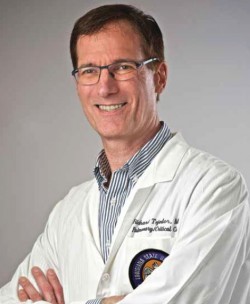Richard Tejedor, MD
Nearly 25 million Americans suffer from asthma.  Luckily, there are very good asthma medications available. However, for a small percentage of asthmatics, asthma drugs do not control their symptoms. Patients with severe asthma continue to need their rescue inhalers regularly or continue to wake up at night with asthma symptoms.
Luckily, there are very good asthma medications available. However, for a small percentage of asthmatics, asthma drugs do not control their symptoms. Patients with severe asthma continue to need their rescue inhalers regularly or continue to wake up at night with asthma symptoms.
Dr. Richard Tejedor is the first pulmonary specialist in the state of Louisiana to perform a new procedure to treat severe asthma. The FDA approved bronchial thermoplasty in 2010 and LSU Health Sciences Center adopted the procedure in 2011. By that point, Dr. Tejedor had already traveled to Washington University in St. Louis to learn the procedure firsthand. “I was excited at the opportunity to be able to offer something new to my patients with severe asthma,” he said. To date, Dr. Tejedor has successfully performed the procedure on 16 patients and the results have been life-changing. “I had patients who couldn’t leave the house,” he explained. “Now they’re traveling and enjoying life.”
Why did you specialize in pulmonary and critical care?
Pulmonary and critical care issues are fascinating in their complexity. I get to be a problem-solver, exploring many different possible causes for each problem a patient presents. It’s intellectually stimulating, but the resulting input can also be very helpful to patients, especially in critical care, where the intervention of a critical illness will have a significant impact on a patient’s outcome.
What is bronchial thermoplasty?
It’s an outpatient procedure we use to treat severe asthma in adults. Asthma is caused by inflammation of the airways and constriction of the smooth muscle tissue beneath. With a specially designed catheter, we apply gentle heat to the airway walls to reduce some of the extra muscle that causes the airways to constrict.
The procedure is done in three stages, with three weeks of healing time in between each stage. Based on the clinical studies available at this time, 80% of patients had significant improvement and showed the same level of improvement five years after the procedure.
Who would be a good candidate?
Severe, persistent asthmatics over the age of 18 — those who have inadequate and inconsistent control of their asthma, despite medication. I examine each patient’s symptoms and administer a breathing test to determine candidacy. I also work closely with other physicians in the community to help make a determination if a patient will benefit from the procedure.
What risks are involved?
Any procedure that requires sedation has risks. Studies have found that bronchial thermoplasty is very well tolerated. Some patients experience asthma-like side effects, but these typically disappear within 24 hours of the procedure. No long-term negative side effects or complications have been detected.
Will insurance cover it?
While Medicare and many insurance companies do cover bronchial thermoplasty, some may have not yet updated their plans to include it. Once we’ve determined that a patient is a good candidate for the procedure, we work with that patient’s insurance company to help secure coverage, if necessary.
ADDRESS:
LSU Health Sciences Center
Pulmonary/Critical Care Section
1901 Perdido Street, Suite 3205
New Orleans, LA 70112
PHONE:
(504) 568-4634
RESIDENCY:
Internal Medicine, Tulane University Affiliated Hospitals
FELLOWSHIP:
Pulmonary/Critical Care Medicine, LSUHSC, School of Medicine
SPECIALTIES/BOARD CERTIFICATIONS:
Pulmonary Disease
Critical Care
